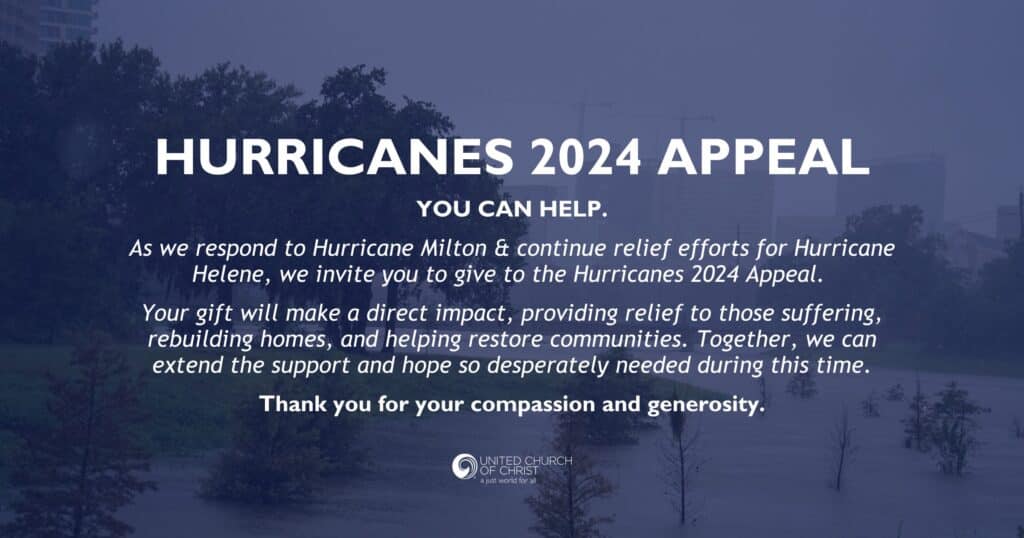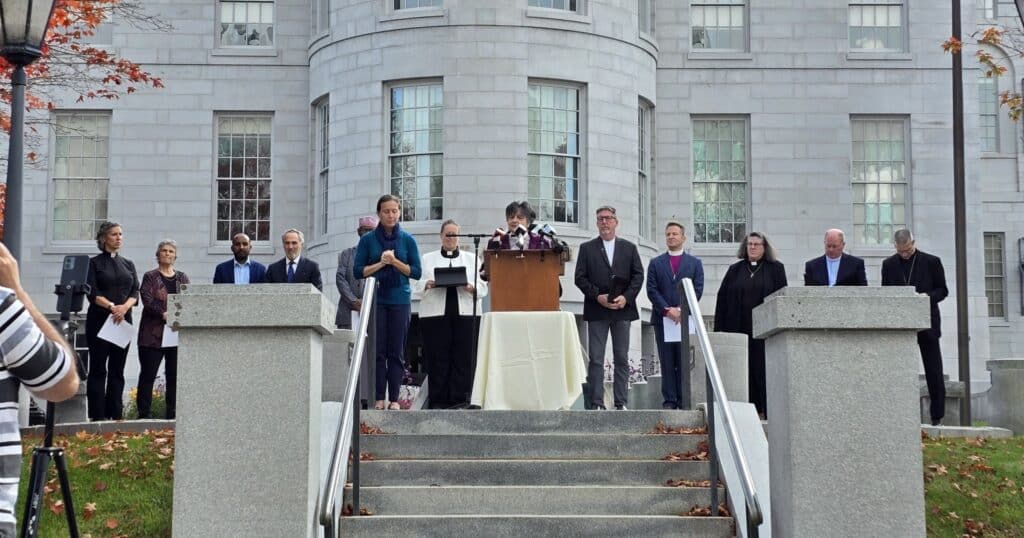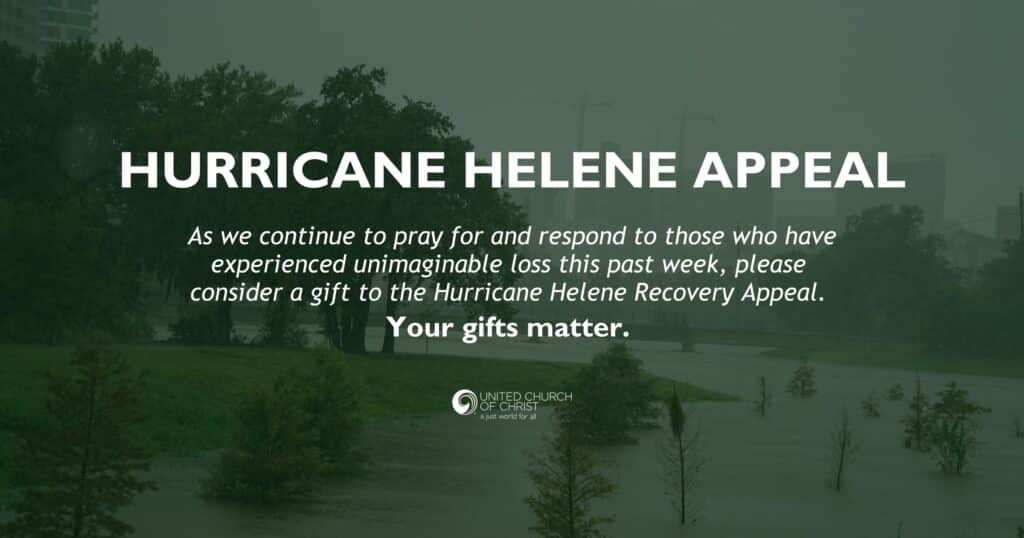Help for most vulnerable in Houston (TX), Sonoma (CA) after disasters
 If you’re a new immigrant, perhaps undocumented, already struggling to make ends meet, and disaster pushes you beyond your ability to cope, where do you turn for help?
If you’re a new immigrant, perhaps undocumented, already struggling to make ends meet, and disaster pushes you beyond your ability to cope, where do you turn for help?
For many of these especially vulnerable Hurricane Harvey survivors in Houston, TX the “go-to” is ECHOS (Epiphany Community Health Outreach Service). For many Sonoma, CA wildfire survivors, it’s First Congregational Church UCC.
And grants from UCC Disaster Ministries are helping these two social service ministries meet a dramatic increase in need due to the recent disasters.
Both ministries serve mostly low-income, majority Spanish-speaking immigrant communities, including many undocumented. Both already have the trust of their communities as “safe spaces” to turn to for necessary resources in times of need.
“There are resources available to support people with lost wages, rent and medical aid, but those resources can be difficult to navigate without help,” said the Rev. Dr. Curran Reichert, Pastor of First Congregational.
With support from UCC Disaster Ministries and the UCC’s Northern California-Nevada Conference, the church has hired a “navigator” to be available each day in Sonoma’s Springs neighborhood during community meal distribution and at other gatherings to help direct affected people to available resources – from safe sources.
Pastor Reichert said that when she and navigator/community organizer Mario Castillo visited their local Disaster Relief Center, they learned that “all information collected from FEMA is potentially shared with ICE, hence, even if there is a citizen in the family able to register for help, there is also great risk involved for our undocumented brothers and sisters.”
The navigator will work part time for three months “to make sure that these very vulnerable community members are able to access resources, despite fear and language barriers,” Pastor Reichert said.
At ECHOS, an Episcopal social services ministry in Houston, staff now start every conversation with clients this way:
“Did you flood due to Hurricane Harvey?”
More often than not, the clients answer, “Yes.”
 “ECHOS is located next to a church, and has the reputation of being an open and safe place over the years,” said director Cathy Moore. “Our mission is to connect people in need with health, social and educational resources that can improve their lives. People know we help in their most critical times in life when things are toughest for them.”
“ECHOS is located next to a church, and has the reputation of being an open and safe place over the years,” said director Cathy Moore. “Our mission is to connect people in need with health, social and educational resources that can improve their lives. People know we help in their most critical times in life when things are toughest for them.”
After Hurricane Harvey had passed, “as soon as people could get out of their homes, there were lines outside our door,” Moore said. “That Thursday and Friday, we served 100 families a day. That Saturday, we had a ‘disaster food fair,’ and 450 families showed up. We’ve never seen that many families on a Saturday.
“And they kept coming. People had run out of their homes with just the clothes on their back. They needed toothpaste, soap, cleaning supplies, food, diapers. We’ve distributed CWS Emergency Cleanup Buckets, personal hygiene supplies, incontinence supplies for adults and diapers for children, truckloads of food.”
In the two months since Harvey, ECHOS has served more than 4,200 individuals. In all of 2016, the agency served just under 9,000 individuals. These numbers are unduplicated and do not reflect total numbers of times a client is seen. Neither do they include the thousands served at food fairs.
Funding from UCC Disaster Ministries is enabling ECHOS to pay extra staff hours to meet increased caseload due to Hurricane Harvey. The Christian Church (Disciples of Christ) Week of Compassion and Church World Service also are contributing.
“Eventually we’ll get back to our normal services, addressing poverty, access to health care and benefits, unemployment and domestic violence, to name a few,” Moore said. “We offer ESL, health screenings and computer literacy classes. For now, the agency must also address the stress Hurricane Harvey has added to an already economically and socially stressed population.”
ECHOS staff have a low-key, conversational way of identifying clients’ needs, she continued. “Did you flood? Did you miss work? How were you affected? Lose your car? We have bus passes. Lose your job? We can get you some financial support. Are you back in your apartment but sleeping on the floor? We can get you some bedding, and a voucher for a mattress.
“Many families don’t have a clue about what services are available to them. Often, they are afraid to ask,” Moore said. “For example, a woman with an autistic child came in asking only for food. She was flooded. She was so grateful to get a $150 voucher and metrocards so she and her son could get around.
“Another mother, whose son has cerebral palsy and is in a wheelchair, reported that they had lost everything to Harvey-related flooding. They moved in with a daughter, who had also suffered flood damage. Get got them vouchers and beds. Imagine having a disabled child and losing everything, including things needed to care for him.”
Moore added, “We have 30 immediate partners that provide their services at our site. If someone needs something we don’t have here, we refer them out.”
Related News
UCC expands appeal for relief efforts following Hurricane Milton
The United Church of Christ has extended the scope of its appeal for Hurricanes 2024 Relief...
Read MoreMaine Conference holds interfaith remembrance to grieve, heal one year after Lewiston shootings
A group of interfaith leaders offered public prayer and space to grieve last Tuesday for those...
Read MoreUCC issues appeal for those impacted by widespread destruction of Hurricane Helene
The United Church of Christ has launched an appeal and opportunities to support recovery...
Read More

